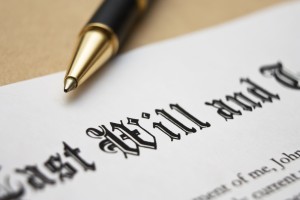Estate Planning FAQs
Probate proceedings are needed to ensure an orderly transfer of estate planning property. It is also necessary to:
Safeguard the deceased’s estate
Pay all debts and taxes
Resolve who is entitled to what assets and to disburse the property accordingly.
Do I Need a Lawyer?
Although it is possible to make a perfectly valid and effective will by yourself, most people should consider hiring an attorney to draft their will. In addition to insuring that the will is valid, attorneys are frequently able to assist clients with the following:
Improving their estate planning by suggesting alternatives or considerations that might otherwise be overlooked.
Avoiding problems caused by unclear language.
Reducing or eliminating challenges on the grounds of undue influence, fraud, or forgery.
Furthermore, the services of an attorney to prepare a simple will are not expensive. Where tax planning considerations, a need for detailed instructions, or special problems are not present, a simple will can be obtained for a fee of approximately $150.00 to $300.00, which is a small price to pay for the additional security of professional assistance. Where tax planning considerations, a need for detailed instructions or special problems do exist, the cost will be higher, but so will the benefits. Tax savings alone can frequently pay all the attorney fees.
Note: An attorney should be consulted where:
The gross value of your estate, including life insurance, employer death benefits, and anything you might inherit from your spouse or others, exceeds $600,000.
Where one or more of your heirs may have trouble managing their affairs due to age, infirmity, improvidence, lack of training, or simply lack of desire.
Where there are businesses or partnerships involved.
Where there might be substantial conflict among the heirs.
Where there are any other unusual or bothersome circumstances.
The inability of your designated executor to serve as such.
What Does a Personal Representative Do?
In most cases, a personal representative is responsible for handling and settling the deceased’s estate planning. Their responsibilities include:
Contacting the heirs and creditors concerning the probate proceedings
Collecting and taking inventory of the probate assets belonging to the deceased
Determining and paying for state, federal and income taxes
If necessary, selling property in order to pay back taxes and/or expenses.
Distributing remaining proceeds to designated family members and relatives.
What are the Probate Costs for Utah?
The filing fees for adoptions, probate/estate planning, guardianship, conservatorship and name changes are each $360. For additional information including copy fees please refer to the Filing Fee Schedule.
What Exactly is a Will?
A will is a written legal document. It allows you to:
Name the people and organizations that you choose to receive your property: both personal property and real estate.
Name the person you wish to be guardian for your unmarried children under 18 in the event there is no surviving parent.
Name your “personal representative” as well as an alternate personal representative. A personal representative is a person or trust company that you wish to handle your estate planning affairs after your death.
In some cases, you may be able to avoid or minimize, in a legal way, any taxes your estate or your family may owe;
Make special provisions, perhaps by means of a trust, for the care of your minor children or some other family members who may have special needs;
In general, avoid many problems which can occur if you die without a valid estate planning will.
(Source: Utah State Bar)
Should I Make a Will?
Every adult who is in possession of property or who has a spouse and/or children should consider writing a will. You do not have to have a large estate to prepare a will. Anyone owning “personal property” such as cash, stocks, or “real property” such as a home or land, should prepare a will. Additionally, preparing a proper will may help reduce future expenses such as taxes.
What if I Die Without a Will?
If you have passed away without a will, you are said to have died “intestate”. Your property will be divided up according to a formula fixed by law and the court will designate an administrator to handle your affairs. Following payment of taxes, debts, funeral and administrative costs, the remaining property will be divided among the surviving spouse, children, and relatives.
Who Should Prepare my Will?
You may prepare your own, handwritten will. This will is called a “holographic will”. A witness is not needed, but you must sign the will. However, due to the complex nature of laws surrounding wills, it may be a good idea to have the assistance of a lawyer. If you have a simple will, the costs should be relatively low.
Can I Change my Will?
Yes, the original creator of the will may revoke or change it at any time. Changes are often made by a document called a “codicil” which is a supplement to the will. In order to make sure the changes have been legally made, you may wish to consult with an attorney who is experienced in estate planning.
When Should I Consider Changing My Will?
Certain circumstances may necessitate the changing of a will. These may include:
Family changes such as new births, marriages, or deaths.
Considerable changes occurring in the amount or type of property you possess.
Changing tax laws.
For more information about Estate Planning, click here.

